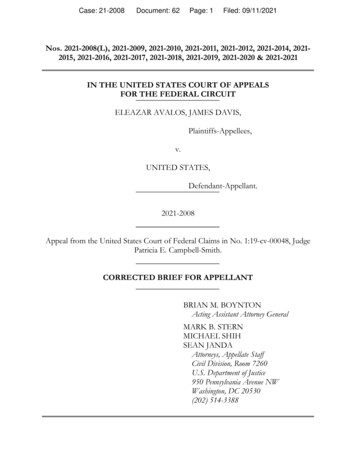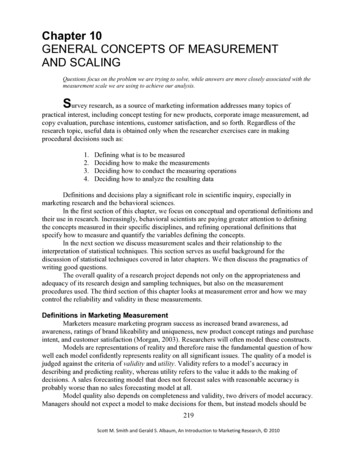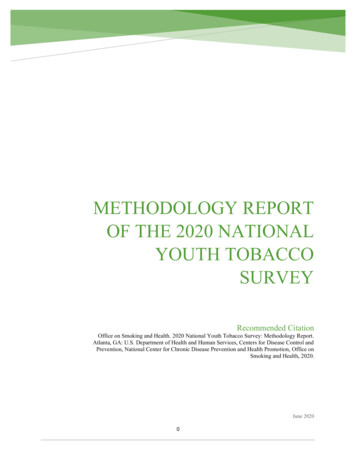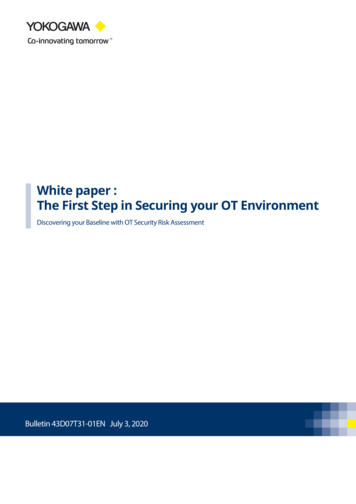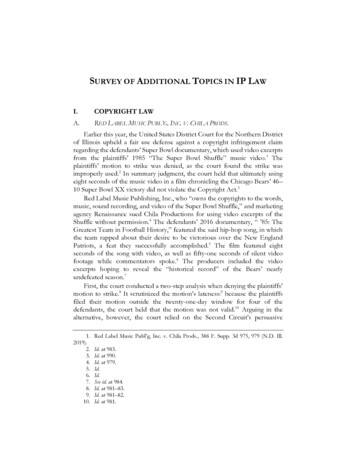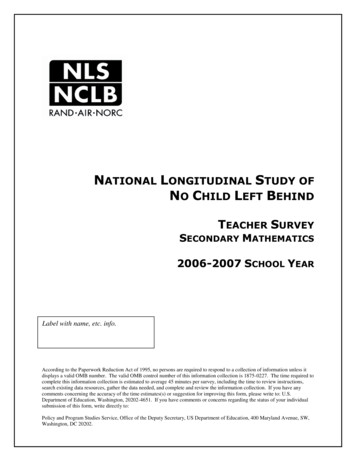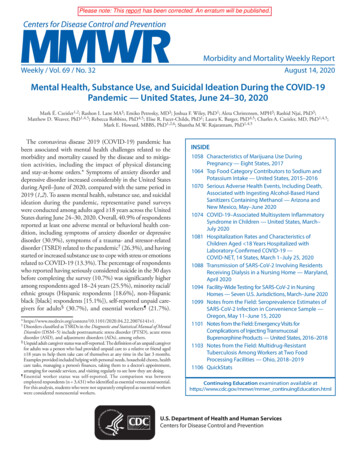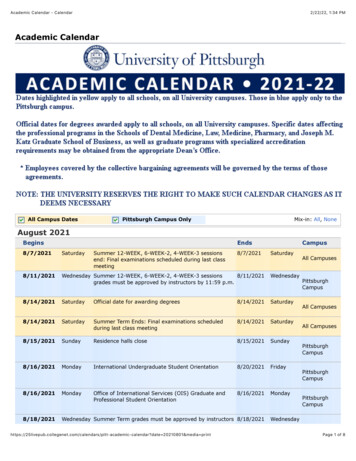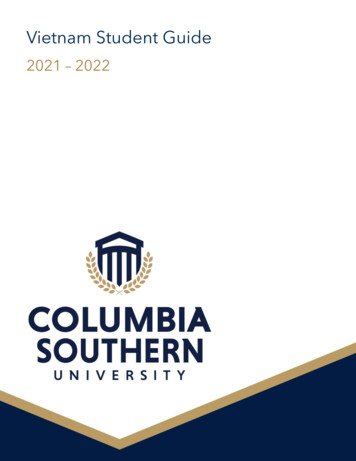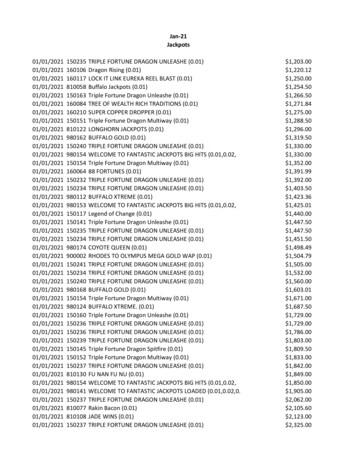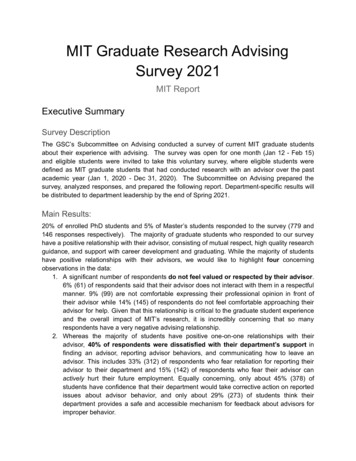
Transcription
MIT Graduate Research AdvisingSurvey 2021MIT ReportExecutive SummarySurvey DescriptionThe GSC’s Subcommittee on Advising conducted a survey of current MIT graduate studentsabout their experience with advising. The survey was open for one month (Jan 12 - Feb 15)and eligible students were invited to take this voluntary survey, where eligible students weredefined as MIT graduate students that had conducted research with an advisor over the pastacademic year (Jan 1, 2020 - Dec 31, 2020). The Subcommittee on Advising prepared thesurvey, analyzed responses, and prepared the following report. Department-specific results willbe distributed to department leadership by the end of Spring 2021.Main Results:20% of enrolled PhD students and 5% of Master’s students responded to the survey (779 and146 responses respectively). The majority of graduate students who responded to our surveyhave a positive relationship with their advisor, consisting of mutual respect, high quality researchguidance, and support with career development and graduating. While the majority of studentshave positive relationships with their advisors, we would like to highlight four concerningobservations in the data:1. A significant number of respondents do not feel valued or respected by their advisor.6% (61) of respondents said that their advisor does not interact with them in a respectfulmanner. 9% (99) are not comfortable expressing their professional opinion in front oftheir advisor while 14% (145) of respondents do not feel comfortable approaching theiradvisor for help. Given that this relationship is critical to the graduate student experienceand the overall impact of MIT’s research, it is incredibly concerning that so manyrespondents have a very negative advising relationship.2. Whereas the majority of students have positive one-on-one relationships with theiradvisor, 40% of respondents were dissatisfied with their department’s support infinding an advisor, reporting advisor behaviors, and communicating how to leave anadvisor. This includes 33% (312) of respondents who fear retaliation for reporting theiradvisor to their department and 15% (142) of respondents who fear their advisor canactively hurt their future employment. Equally concerning, only about 45% (378) ofstudents have confidence that their department would take corrective action on reportedissues about advisor behavior, and only about 29% (273) of students think theirdepartment provides a safe and accessible mechanism for feedback about advisors forimproper behavior.
MIT Graduate Research Advising Survey, April 20213. There is a clear lack of communication of expectations between advisors andstudents. 23% (242) of respondents feel there is a lack of communication around advisorexpectations, 18% (166) do not know what is expected for maintaining their funding, and29% (279) do not understand expectations for an acceptable thesis/dissertation.4. 19% (191) of respondents are dissatisfied with their advisor’s research guidance,with 18% (169) of respondents stating that if they started over, they would not choosetheir current advisor. Also, 23% (192) of respondents in a research group are dissatisfiedwith their advisor’s effectiveness at managing tasks and people.Recommendations:Students would benefit from increased advisor communication about expectations for research,graduating, and funding. Departments can provide frameworks for discussing theseexpectations (semesterly check-ins, written expectations at the beginning of a researchappointment, or individual development plans) and advisors can proactively take steps todiscuss expectations with each of their students throughout their degree. In addition, facultyadvisors should consider how to improve the overall quality of research guidance. This mayinclude sharing “best practices” across MIT, providing training to faculty, allocating morementoring time to each student, and departmental evaluation of advising for promotion/tenure.We are encouraged by the recent formation of an Ad Hoc Committee for a Strategic Plan onGraduate Mentoring Advising and urge departments and faculty to consider targetedimprovements to advising practices.In addition, department leadership and faculty should work to provide improved mechanisms forfinding and switching advisors, such as a clear and visible matching procedure for advising,publicizing available research appointments, funding a year of advisor/lab rotations,implementing Advising Philosophy Statements, and/or ensuring that both students and advisorhave input on their advisor match. Fears around increased degree length, loss of funding, andfinding an advisor were the main obstacles to switching advisors. Departments cancommunicate mechanisms and common trajectories for students who choose to switch advisorsmid-degree, including procedures for receiving departmental transition funding, rules for usingresearch with a previous advisor in a dissertation, and easing the advisor selection process.Department leadership should also work to build confidence in their student body that thedepartment will protect students from retaliation and take reporting seriously. This can beachieved through a clear and well known knowledge base that explicitly gives examples on whatwould happen in cases of retaliation, and through taking any student report seriously (andcommunicating this to students), independent of the power dynamics of the reported situation.To reduce fears of retaliation, departments can also help proactively reduce some of theperceived power imbalance by ensuring that more than one advisor/faculty member is able towrite recommendation letters and approve a thesis (see MIT’s NASEM report for in-depthdiscussion on power imbalance).Also, we note that this fear of reporting persists even with MIT’s current anonymous reportingresource (EthicsPoint). We urge MIT to work with departments and students to investigate waysOnline Results: gsc.mit.edu/advising-survey/results
MIT Graduate Research Advising Survey, April 2021to improve reporting mechanisms so that reporting becomes accessible to students. Some initialrecommendations include: providing concrete examples of the reporting process and eventualoutcome when the accusation is confirmed (including potential consequences for faculty);providing closure to cases, even anonymous ones, through anonymous tracking numbers insidea protected website; providing training to faculty and students on having respectful andempathetic conversations when issues arise. Given that the majority of respondents do notbelieve their department would take corrective action against a faculty member, it is important tocommunicate to students that departments will take action and delineate the possible actions(educational intervention, reduction in privileges/resources, etc.).We hope that by taking a deeper look at current advising practices and department supportsystems, MIT can create a supportive environment for all graduate students at MIT, so thateveryone can have a successful and healthy research experience.Section SummariesAdvisor Behavior:A common trend we see in the data is that for most students ( 90%) their one-on-onerelationships with their advisor are respectful and caring, with students feeling comfortableexpressing their opinions and approaching their advisor. A minority but still sizable number ofstudents (8%, 83) disagree or are ambivalent about whether their relationships are respectful.The most common (negative) experience of graduate students was lack of communicationabout advisor expectations (23%, 242), feeling uncomfortable meeting advisors without tangibleprogress (25%, 258), and even approaching an advisor for help (14%, 145) or expressing theirprofessional opinion (9%, 99).Research Guidance:Specifically with regard to research guidance, while the majority of respondents are satisfiedwith their quality of advising, a large portion of students feel somewhat or extremely dissatisfiedwith their advisor’s research guidance (19%, 194) and frequency of one-on-one meetings withtheir advisor (17%, 176). For example, 22% (222) of respondents meet with their advisorone-on-one 1-2 times per semester or less while only 6% (59) of respondents choose thatfrequency for their ideal meeting frequency. In addition, 17% ( of students would choose adifferent advisor if they started over.For most students, their advisor manages a research group consisting of multiple graduatestudents. While the majority of respondents feel their advisor effectively manages their group, alarge minority of respondents slightly or strongly disagreed with statements such as “my advisoreffectively manages tasks and people” (23%, 192), “my advisor effectively runs meetings”(16%), and “my advisor effectively manages tasks” (23%, 134). In addition, a smaller number ofrespondents felt their advisor cultivates disrespectful and exclusionary labs, agreeing withfeeling disrespected in their lab (6%, 50), feeling excluded by colleagues in their research group(9%, 74) and disagreeing with statements such as feeling comfortable expressing opinions inOnline Results: gsc.mit.edu/advising-survey/results
MIT Graduate Research Advising Survey, April 2021labs (10%, 85) and their advisor cultivating an including & accepting environment (8%, 68).Finally, only 48% (399) of survey participants agree or strongly agree with the fact that theiradvisors manage lab related conflicts efficiently.Funding & Career GuidanceOnly 70% (664) of respondents with funding understand what is expected of them to maintainfunding and 10% (88) students do not know whether their funding is secured for the next year.Given that future employment is a large stressor for graduate students, we were concernedseeing that only 49% (481) of students are encouraged by their advisor to partake innon-research related career development and 15% of students interested in non-academiccareers (industry, non-profit/government, and other) are uncomfortable even expressing interestin those careers to their advisor.Graduating:One of the most pervasive sentiments around advising is a dissatisfaction aroundcommunicating expectations for graduating. 29% (279) of respondents disagreed (strongly orsomewhat) with the statement “I understand my advisor’s research expectations for anacceptable thesis/dissertation” and 24% (234) of respondents are dissatisfied with the frequencywith which they discuss graduation progress with their advisor. More actively discussing andengaging the topic of graduating is especially important given that 20% (200) of respondentssaid their personal expected graduation timeline was longer or shorter than their advisor’stimeline with 5% (48) of respondents saying it was much longer/shorter .Switching Advisors & Support23% (214) of students feel stuck with their advisor which is especially concerning given that10% (92) of students would like to switch advisors. In considering reasons students feel stuck,we asked students for the largest obstacles to switching advisors. The top three obstaclesinclude: degree would be longer (72%, 669), not finding an advisor (60%, 558), and loss offunding (40%, 372).We also asked students about their satisfaction with various support mechanisms with theirdepartment, which received the largest dissatisfaction compared to other sections of the survey.Most concerning was that only 42% (393) of respondents are confident that their departmentwould take corrective action for advisor issues and as many as 34% (312) fear retaliation forreporting advisor behavior. In addition, 15% (142) of students are afraid their current advisorcould actively hurt their future employment, which we suspect contributes to fear of retaliation.Finally, there were many students dissatisfied with their department's support when it comes tomatching students with advisors, providing feedback about advisors for improper behavior, andcommunicating pathways for switching advisors. This is especially concerning given that asizable portion of the population do not have a faculty member or person in a leadershipposition with whom they are comfortable talking to about advisor issues.Online Results: gsc.mit.edu/advising-survey/results
MIT Graduate Research Advising Survey, April 20211. Advisor BehaviorOnline Results: gsc.mit.edu/advising-survey/results
MIT Graduate Research Advising Survey, April 20212. Research GuidanceOnline Results: gsc.mit.edu/advising-survey/results
MIT Graduate Research Advising Survey, April 2021Online Results: gsc.mit.edu/advising-survey/results
MIT Graduate Research Advising Survey, April 20213. Group/Lab ManagementOnline Results: gsc.mit.edu/advising-survey/results
MIT Graduate Research Advising Survey, April 20214. FundingOnline Results: gsc.mit.edu/advising-survey/results
MIT Graduate Research Advising Survey, April 20215. Teaching Assistance (TA-ing)Online Results: gsc.mit.edu/advising-survey/results
MIT Graduate Research Advising Survey, April 20216. Career DevelopmentOnline Results: gsc.mit.edu/advising-survey/results
MIT Graduate Research Advising Survey, April 20217. GraduatingOnline Results: gsc.mit.edu/advising-survey/results
MIT Graduate Research Advising Survey, April 20218. Advisor Satisfaction and Switching AdvisorsOnline Results: gsc.mit.edu/advising-survey/results
MIT Graduate Research Advising Survey, April 20219. Support & ReportingOnline Results: gsc.mit.edu/advising-survey/results
MIT Graduate Research Advising Survey, April 2021A. Appendix: DemographicsResponse RatesMIT-wide data taken from 2020-2021 enrollment data.[Source: lment-statistics-year]Online Results: gsc.mit.edu/advising-survey/results
MIT Graduate Research Advising Survey, April 2021*Note: “Other” category includes interdisciplinary programsURMs (PhDs-Only)A4. Response Breakdown by URMGroup% SurveyRespondents% MIT EnrolledStudentsFemale48%36%Asian29%13%Black or African American2%2%Hispanic or Latino8%5%Online Results: gsc.mit.edu/advising-survey/resultsNote: Percentage calculated from all responses(including non-responses). Students that selectedmultiple ethnicities counted in each ethnicity.
MI T G raduat e Research A dvi si ng S urvey, A pri l 2021 3. T here i s a cl ear l ack o f co mmu n i cati o n o f exp ectati o n s bet ween advi sors and st udent s. 23% (242) of respondent s f e
